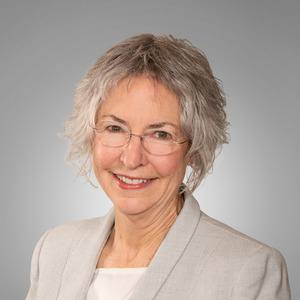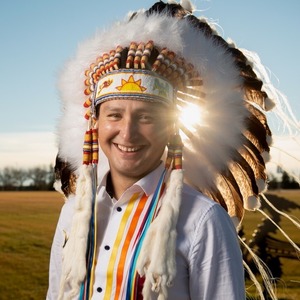On June 5 and 6, Athabasca University will grant honorary degrees to recognize two distinguished provincial and national leaders who embody AU’s values and its highest contribution to a better and more equal world.
Joy Romero will be granted an Honorary Doctor of Science degree to recognize of her leadership in a STEM field and her passionate support of AU’s mission to widen access and opportunity to learners and knowledge—especially for those excluded or from rural and Northern communities.
Cadmus Delorme will be granted an Honorary Doctor of Laws degree to recognize his national leadership and advocacy for post-secondary education, particularly Indigenous post-secondary education, and working towards truth and reconciliation by fostering understanding and meaningful relationships between Indigenous and non-Indigenous peoples, government, businesses, and communities.
“AU is unlike any other university, and we hold a special appreciation for people like Joy and Cadmus whose many contributions reflect AU’s enduring and diverse commitment to access, opportunity and community,” said AU President Dr. Alex Clark. “We are honoured to recognize Joy Romero and Cadmus Delorme at our 2025 convocation in Athabasca.”
Joy Romero
 Joy Romero has devoted her career to fostering access, opportunity, and innovation to improve the lives of others. With an outstanding career in technology and innovation, she demonstrates an enduring commitment to promote access to post-secondary education for non-traditional learners and opportunities in science education and research for everyone.
Joy Romero has devoted her career to fostering access, opportunity, and innovation to improve the lives of others. With an outstanding career in technology and innovation, she demonstrates an enduring commitment to promote access to post-secondary education for non-traditional learners and opportunities in science education and research for everyone.
Educated as a metallurgist, as an engineer, businesswomen, and senior executive she understands that access and opportunity in education changes lives.
When she was earning her engineering degree, she was one of very few women who were pursuing careers in the sciences. The idea of inclusion, for Romero, goes far beyond any one group. Rather, she said it’s crucial to understand where people are coming from and providing them with the right opportunities.
We need to build the pathways so nobody’s excluded. I’ve always tried to reach total populations, whole populations who are interested in STEM.
Joy Romero, Honorary Doctor of Science
This commitment is reflected in her mentorship of countless emerging leaders and her development and leadership of the Learning Communities project in northern Alberta to bring education and training opportunities to work sites and remote northern communities through workshops, information sessions, and work-study programs.
Romero has supported numerous charitable and philanthropic causes, particularly those aimed at advancing education, health, and environmental sustainability. Her work in this area exemplifies values that AU holds dear: the integration of learning with community service and stewardship.
Her outstanding commitment to providing accessible, flexible, and innovative learning opportunities for learners of all backgrounds and stages was epitomized in her role as chair of Athabasca University’s Governing Council from 2006 to 2009. While the honorary degree recognizes her contributions and leadership, with her enduring sense of the unique potential of people and opportunity, she credits others for their contributions.
“Nobody does anything by themselves,” she said. “I’ve always had the privilege of working with and leading really smart people who do great things.”
Cadmus Delorme
 Cadmus Delorme has devoted his life to growing access, opportunity and community by reducing barriers to post-secondary education for Indigenous students, and fostering authentic respect and collaboration through mutual understanding between Indigenous and non-Indigenous peoples. His is a voice that is truly national and truly influential.
Cadmus Delorme has devoted his life to growing access, opportunity and community by reducing barriers to post-secondary education for Indigenous students, and fostering authentic respect and collaboration through mutual understanding between Indigenous and non-Indigenous peoples. His is a voice that is truly national and truly influential.
As an undergraduate student at First Nations University, and president of its students’ union, Delorme became a national voice for Indigenous post-secondary education, advocating for the restoration of permanent national and provincial funding for the university. Thanks to his efforts and those of his student peers, the university continues today to provide accessible post-secondary education for Indigenous and non-Indigenous students.
After completing his master of public policy degree from the University of Regina, Delorme served as Chief of Cowessess First Nation from 2016-2023. His focus was building community through strengthening Indigenous governance, improving child welfare services, guiding the First Nation to equity partnerships in two major renewable energy projects, increasing agricultural capacity, and many cultural rejuvenation projects.
Crucially, in 2023, Delorme became a national leader in Truth and Reconciliation, when he announced the tragic discovery of 750 unmarked graves on Cowessess First Nation at the former site of the Marieval Indian Residential School site. His words captured the attention of Canadians and the pressing need for reconciliation.
All we ask of all of you listening is that you stand by us as we heal, and we get stronger, and that we must all put down our ignorance and accidental racism of not addressing the truth that his country has with Indigenous people. We are not asking for pity, but we are asking for understanding, and this country must stand by us.
Cadmus Delorme, Honorary Doctor of Laws
Leadership, for Delorme, is about supporting as much as it is about doing: “At the time I didn’t really feel like I was doing big things. I was just doing my duty as Chief.”
Delorme sees business reconciliation as foundational to creating opportunity for Indigenous Peoples and communities. He founded two organizations: OneHoop, which helps connect businesses, government, and Indigenous communities; and Flowing River Capital, a complementary organization focused on supporting First Nations, Métis, and Inuit communities to become equity partners in businesses.
Delorme also served as chairperson of the Government of Canada’s Residential School Documents Advisory Committee and is chair of University of Regina’s Board of Governors.
Delorme’s focus on reconciliation reflects AU’s work towards conciliation, led by Nukskahtowin, an Indigenous meeting place and centre for ideas, perspectives, and people to come together.
Convocation 2025—a celebration like no other!
Read more stories about AU students and grads as part of our Convocation 2025 coverage.